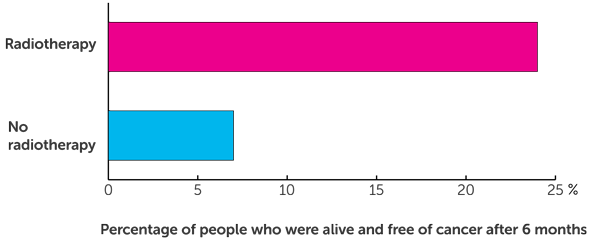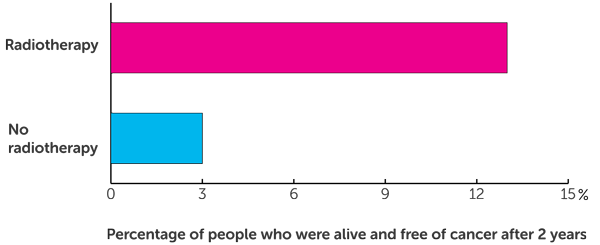A trial looking at radiotherapy in small cell lung cancer (REST)
Cancer type:
Status:
Phase:
This trial looked at radiotherapy after chemotherapy for people who had small cell lung cancer. The trial was for people with small cell lung cancer (SCLC) that had spread beyond their lungs or had a large amount of disease within the chest ( ).
).
More about this trial
Doctors usually treat extensive disease small cell lung cancer (SCLC) with chemotherapy. They also give radiotherapy to the brain of people whose cancer responded to chemotherapy. This is to reduce the risk of the cancer spreading to their brain. They most often use a  and another chemotherapy drug called etoposide.
and another chemotherapy drug called etoposide.
This treatment may work quite well at first, causing the cancer to shrink, or even disappear in some people. But sadly, the cancer comes back in most people. Doctors hoped that giving radiotherapy to the chest would help to delay the cancer coming back.
This trial aimed to find out if having radiotherapy to the chest after platinum chemotherapy helped to delay small cell lung cancer coming back and improves survival.
Summary of results
The trial team found that radiotherapy to the chest did delay the cancer coming back and could help people live longer if their small cell lung cancer had responded to chemotherapy.
This was a phase 3 trial that recruited 498 people. It was a randomised trial. The people taking part were put into treatment groups by a computer. Neither they nor their doctor could decide which group they were in.
The researchers were able to look at the results of
- 247 people who had radiotherapy to the chest
- 248 people who didn’t have radiotherapy
They found that cancer was less likely to come back in those people who had radiotherapy.
At 6 months, the number of people in both groups who were alive and free of cancer was
- 24 out of every 100 people (24%) who had radiotherapy
- 7 out of every 100 people (7%) who didn’t have radiotherapy
The trial team followed up the people taking part for an average of 2 years. They found that the number of people who were still alive after 1 year was
- 33 out of every 100 people (33%) who had radiotherapy
- 28 out of every 100 people (28%) who didn’t have radiotherapy
They looked at this again after 2 years and found the number of people still alive then was
- 13 out of every 100 people (13%) who had radiotherapy
- 3 out of every 100 people (3%) who didn’t have radiotherapy
The most common bad side effects from radiotherapy were tiredness (fatigue) and shortness of breath.
The trial team concluded that doctors should consider giving radiotherapy to people with extensive disease small cell lung cancer that had responded to chemotherapy.
We have based this summary on information from the team who ran the trial. The information they sent us has been reviewed by independent specialists ( ) and published in a medical journal. The figures we quote above were provided by the trial team. We have not analysed the data ourselves.
) and published in a medical journal. The figures we quote above were provided by the trial team. We have not analysed the data ourselves.
Recruitment start:
Recruitment end:
How to join a clinical trial
Please note: In order to join a trial you will need to discuss it with your doctor, unless otherwise specified.
Chief Investigator
Professor Corinne Faivre-Finn
Supported by
Cancer Research UK
Dutch Cancer Society
Dutch Lung Cancer Research Group
Experimental Cancer Medicine Centre (ECMC)
Manchester Academic Health Science Centre Trials co-ordination unit (MAHSC-CTU)
NIHR Clinical Research Network: Cancer
The Christie NHS Foundation Trust
Other information
This is Cancer Research UK trial number CRUKE/10/034.
We have more information about the work of Professor Corinne Faivre-Finn.
If you have questions about the trial please contact our cancer information nurses
Freephone 0808 800 4040





